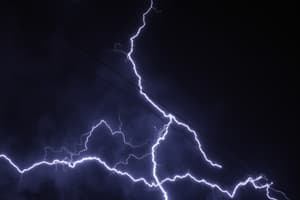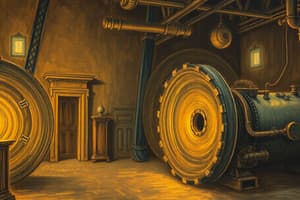Podcast
Questions and Answers
Which type of current flows in one direction through a conductor?
Which type of current flows in one direction through a conductor?
- Alternating Current (AC)
- Variable Current (VC)
- Direct Current (DC) (correct)
- Circular Current (CC)
What type of current periodically changes direction, flowing back and forth through a conductor?
What type of current periodically changes direction, flowing back and forth through a conductor?
- Direct Current (DC)
- Rotational Current (RC)
- Rectified Current (RC)
- Alternating Current (AC) (correct)
Which source typically produces DC current?
Which source typically produces DC current?
- Power stations
- Generators
- Solar cells
- Batteries (correct)
What is the main source of AC current in the electrical grid?
What is the main source of AC current in the electrical grid?
Electric current is the flow of __________ through a conductor per unit time.
Electric current is the flow of __________ through a conductor per unit time.
What is the fundamental concept in the world of physics and electricity?
What is the fundamental concept in the world of physics and electricity?
How is electric current defined?
How is electric current defined?
What is the unit for electric current?
What is the unit for electric current?
How is current density defined?
How is current density defined?
What type of current is characterized by varying current density across the conductor?
What type of current is characterized by varying current density across the conductor?
Why is the current in a wire carrying alternating current (AC) considered non-uniform?
Why is the current in a wire carrying alternating current (AC) considered non-uniform?
Flashcards are hidden until you start studying
Study Notes
Understanding Electric Current
Electric current is a fundamental concept in the world of physics and electricity, yet it's often misunderstood due to its abstract nature. This article aims to demystify electric current by examining its basic definition and properties.
Definition
Electric current is the flow of charge—specifically, the flow of electrons—through a conductor like a wire. More technically, it refers to the rate at which charge moves through a cross-sectional area of a conductor. The unit for electric current is the ampere, often shortened to amp (A).
An everyday analogy for electric current is the flow of water through a pipe. Imagine a pipe with a certain cross-sectional area and a specific flow rate (e.g., gallons per minute). The flow rate is similar to electric current in that it describes how much charge (in this case, water) flows through the pipe's cross-sectional area per unit time.
Non-Uniform Current
Most currents you'll encounter in daily life are uniform, meaning they have the same current density (the number of charge carriers per unit area) throughout the conductor. However, it's useful to understand non-uniform current too, which is characterized by varying current density across the conductor.
For example, the current in a wire carrying alternating current (AC) is non-uniform because the current density oscillates back and forth. These oscillations are due to the changing direction of the electric field that drives the current.
Direct Current (DC) vs. Alternating Current (AC)
Electric current can be classified into two main types:
-
Direct Current (DC): A constant current that flows in one direction through a conductor. DC current is produced by batteries, solar cells, and DC power supplies.
-
Alternating Current (AC): A current that periodically changes direction, flowing back and forth through a conductor. AC current is produced by generators and power stations and is commonly used in the electrical grid.
Applications of Electric Current
Electric current has a wide range of applications, including lighting, heating, communication, and power production. For example, batteries use DC current to power portable electronic devices, while the electrical grid relies on AC current to transmit power over long distances.
In summary, electric current is the flow of charge, typically expressed as the number of electrons flowing through a conductor per unit time. It can be uniform or non-uniform, and there are two main types: direct current and alternating current. Understanding electric current is essential for comprehending the fundamentals of electricity and its practical applications in our daily lives.
Studying That Suits You
Use AI to generate personalized quizzes and flashcards to suit your learning preferences.



